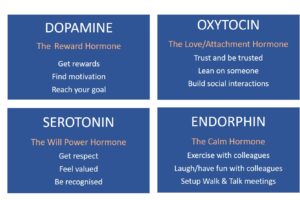Most people believe that happiness comes once success is achieved, and that success and performance come after hard work. But could we be wrong with the equation? What if happiness is not the result of success and performance, but rather the cause of it?
When you feel good, your brain releases hormones called happy hormones: dopamine, oxytocin, serotonin, and endorphins. They are the ultimate happy hormones, produced either by the brain itself or by other organs. Wherever they are produced, our brains are in constant demand for these hormones. But we don’t always get them, the demand cannot be satisfied all the time. In fact, our brain only releases happy hormones if it sees them as a response to a need for survival such as eating, being safe or belonging to a social group. Once this need for survival is satisfied, you get a quick spirt of feel food hormones. The brain then returns to its neutral state until the next “survival opportunity.” Therefore, if you feel up and down, know your hormones might be responsible for your mood swing!
So how do we explain that most of us adopt behaviours that seem contrary to survival such as working too much, eating too much, consuming too much, etc.? How is this possible if your brain only rewards positive behaviours for our survival?
As explained by Dr Loretta Graziano Breuning in her book “Habits of a Happy Brain”, once the effect of the happy hormone spray wears off – and it’s very fast – you feel like something is wrong. Hence, we will try to quickly experience this feeling of pleasure again. And since our brain remembers very well what we did just before being rewarded (eating, playing sports, connecting to social media, gaming, etc.) we will try to reproduce what worked previously. But none of these habits can give continuous happiness because as explained above, our brain doesn’t work this way. So, the more we look for these happy hormones, the more we will have to “consume” to achieve the same level of pleasure. Therefore, we become a ‘happy hormones’ drug addict, even though such behaviour could threaten our survival.
That’s why it’s important to retrain the neural pathway in the brain to focus on new habits that are good for us in the long run, and to turn on the chemicals that make us happy.
Happier = Higher Performance
If I tell you that by adopting a happier, more positive attitude you will be 30% more efficient, would you change your behaviour? And if I tell you that this number was given by one of the biggest experts on the link between happiness and success, Shawn Achor, also author of the bestseller “The Happiness Advantage”, would you be ready to boost your happy hormones?
But before exploring how to increase your dopamine, oxytocin, serotonin, and endorphin levels, let’s take a few moments to describe them in more detail because each one has its own role and importance. This explanation is not intended to be too technical and we will try to simplify a very complex topic. Talking about hormones remains complicated, and science and research have not explained it all yet. If there are endocrinologists among the readers (how did you get here?), please indulge me.
Dopamine is a neurotransmitter. It helps the brain send messages through your nervous system to different parts of the body. It is involved in the reward, motivation and learning systems. Above all, it has this particularity of creating an ”always more” feeling. More and bigger rewards are needed to produce the same level of dopamine. It’s like an addictive drug, something the creators of social media understood very well from the start. They created the ‘likes’. The more we get them, the more dopamine we receive. And the more we want and seek them, the less we are satisfied, as explained by Dr Breuning above. As there are never enough of them, we spend more and more time on social media for instance to search for these shots of happiness that we are less and less satisfied with.
Oxytocin, my favourite one out of the four, is the attachment hormone. It seems to play a role in different situations such as orgasm, social recognition, empathy. It is mainly released in large amounts during childbirth, which helps make the birth easier. It is also given to pregnant women to induce childbirth. So how does it interest us within organizations? You will see below how we can stimulate the release of oxytocin to increase the well-being of employees (in all good honour, of course).
Serotonin is a neurotransmitter like dopamine. It is released when we feel important, confident, respected, valued. It seems that people with a tendency to depression have rather low levels of serotonin often combined with rather high levels of stress hormone cortisol.
Endorphins. Like morphine, they act on receptors in certain cells. They are released in quantity when we experience pain, injury, or significant physical strain. They have a euphoric effect, reduce pain and fear while lowering body temperature.
How to boost these hormones at work?
Here are a few ideas on how to retrain the brain to turn on the chemicals that make us happy:
- First, focus on the type of rewards that motivate you or your team and link them to your goals or those of your team. This is the hardest part. The easiest part is breaking down each of your goals into smaller, shorter-term milestones, which will allow you to receive a shot of dopamine every time you hit a sub-goal. This is the baby steps method.
- Then, take time to genuinely help, encourage, support, or compliment your colleagues to increase loyalty, trust, and generosity in the workplace. By trusting your team members, relying, and leaning on certain colleagues or on your manager, you will increase your oxytocin level. It seems that one minute of positive interaction with a colleague is enough to trigger a dose of oxytocin in the brain. Smiling, talking about what you did on the weekend or actively listening to a colleague sharing a story trigger a dose of oxytocin. How lucky there are other ways to boost this hormone than having to give birth.
- Serotonin, on the other hand, is the hormone of leaders. Someone who says “thank you” has the power to trigger a small dose of serotonin in both the receiver and him/herself. Express your gratitude verbally or in writing for the work done by a colleague, or for the support received from your manager. And the last thing that works to trigger serotonin is to find real meaning in what you do at work.
- Finally, endorphins improve mood and help reduce physical pain and emotional stress. To increase endorphins at work, you need to take part in fun activities or projects with colleagues. Laughter is still the best therapy to boost endorphins, as is exercising with colleagues or organizing ‘walk & talk’ meetings, where you talk about work while getting fresh air and moving around.

Why do hormones matter in the workplace?
On top of the fact that, the more happy hormones we feel, the more efficient we are, hormones affect everyone. Better understanding these hormones will allow you to better understand what affects your workforce. And perhaps one day European organizations will follow the lead of some American employers who have started prescribing so-called health cures to boost dopamine and serotonin levels in their teams. Indeed, some employers are surfing the wave: they have hired medical doctors to practice medical checks on employees to identify potential nutritional and hormonal deficiencies. Based on the results, they prescribe a course of food supplements which will boost dopamine and serotonin. Every morning, the small package of hormonal supplements awaits the employee on their desk! I don’t think such practice could work on this side of the Atlantic, but we never know.
Dopamine-Fast 2.0
Another recent trend in the Silicon Valley is “Dopamine-fast 2.0”. Dopamine fasting, defined in 2016 by Californian psychiatrist Cameron Sepah, consists of reducing or depriving someone of impulsive behaviour (and therefore dopamine) so that the production of this hormone will then be re-stimulated in the future. For 7 days, we deprive ourselves of everything we are addicted to and which gives pleasure. The argument used to sell this latest trend is this: by being over stimulated, our pleasure neurons saturate and are inhibited. “It’s like tiring our pleasure muscle,” explains Jean-Olivier Collinet, Director and Administrator of JobYourself, a Brussels-based coaching company. “The organisations that market this hormone diet call it a brain reset. Their slogan: deprive yourself to preserve our depleted neurons.”
In fact, depriving yourself of pleasure to lower dopamine levels doesn’t work. Although dopamine increases in response to rewards or pleasurable activities, it does not decrease when you avoid over-stimulating activities that give you pleasure. Therefore, a dopamine fast does not actually lower your dopamine levels.
In fact, what Sepah wanted to kickstart with his Dopamine-Fast was a method, based on cognitive behavioural therapy, whereby we could be less dominated by stimuli considered unhealthy – constant notifications, likes, beeps – which are part of our hyper-connected lives.
In conclusion, take your DOSE – Dopamine, Oxytocin, Serotonin, Endorphin – with moderation and from the right activities! In addition to a good mood, these happy hormones will keep you motivated, energised and efficient. They will help you connect with your team, improve your leadership and increase your confidence in yourself and in others. While you can’t control your work environment or the people you interact with, you can take the right steps to boost these happy hormones.


